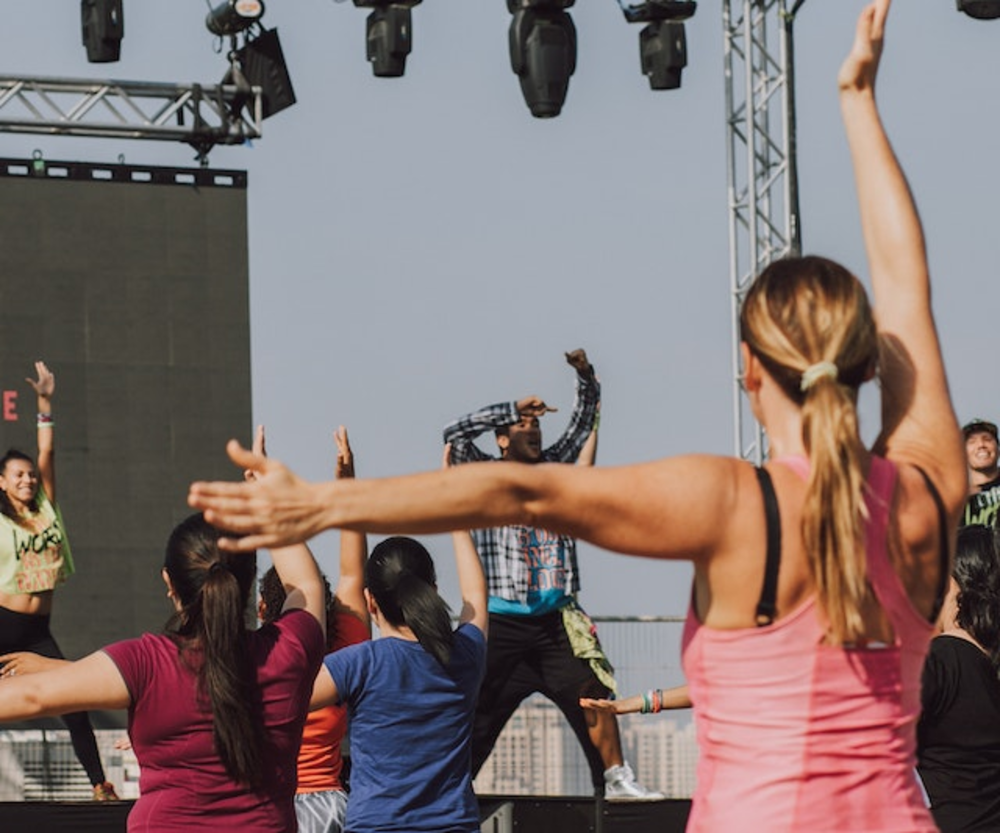When you think of a gym, you might imagine people sweating it out on treadmills, the clanging of weights, or maybe even the rhythmic hum of a spinning class.
But there’s another essential element that sets the tone for any workout: the music.
Gym owners and personal trainers know that the right background music can motivate and engage members, turning a good workout into a great one.
But there’s more to playing music in a fitness business than just hitting ‘play’ on a playlist. Enter the world of music licensing.
Choosing the Right Beat: The Art of Gym Music Selection
Music plays an integral role in setting the ambiance of a gym and motivating its members.
The art of selecting the right music for a gym isn’t just about choosing catchy tunes but involves a deep understanding of the psychology of music, the nature of workouts or fitness challenges, and the preferences of the clients.
Understanding the Psychology of Music
It’s essential to understand how music impacts our brains and bodies. Research shows that fast-tempo music often increases heart rate and stimulates physical activity.
On the other hand, slow-tempo music can help with cool down sessions and yoga classes.
Therefore, understanding the psychology of music can help you choose songs that can drive your clients to perform better and enjoy their workout sessions.
Choosing Music According to Workout Types

Different types of workouts demand different types of music. High-intensity workout challenges like HIIT, CrossFit, or spin classes may require music with a fast tempo and strong beat to keep up with the intense energy of these workouts.
On the other hand, for yoga, Pilates, or meditative sessions, serene and calm music would be more appropriate.
Knowing Your Audience

Knowing your gym members’ preferences is key in gym music selection. Try to have an understanding of the demographics of your gym members, as age, culture, and personal taste can significantly influence music preferences.
You may even consider taking a poll or survey to know your members’ favorite genres or artists. Here are two options of surveys you can use:
Google Forms
Pros:
- Free to use.
- Easy to create and customize.
- Can be shared via email or other means.
- Offers a variety of question types.
- Results are automatically collected and organized.
Cons:
- Requires participants to click on a separate link.
- Might not integrate directly with your gym app.
Virtuagym Questionnaire Tool
Pros:
- Seamlessly integrates with your gym app.
- Allows you to reach members directly within the app.
- Provides a user-friendly interface.
- Offers customizable question templates.
- Collects and organizes responses for easy analysis.
Cons:
- Offered exclusively as part of the Virtuagym Engage Module.
After considering the pros and cons of both options, you can choose the method that best suits your gym’s needs and preferences. Whether you decide to use Google Forms or Virtuagym Questionnaire tool, both options offer valuable insights into your members’ music preferences.
Music Volume and Time of Day

The volume and style of music can also be adjusted depending on the time of day. For instance, during peak morning and evening hours, when the energy is high, playing loud, energetic music can enhance the gym’s atmosphere.
However, during off-peak hours, softer and more relaxed music might be more fitting.
Decoding Music Licensing for Gyms
Music licensing might seem like a complex task to gym owners, but it is a crucial aspect of running a fitness business.
Let’s explore the importance of music licenses, the functionality of music licensing, and how to secure one for your fitness center.
The Importance of Music Licenses
When you play music in a commercial setting like a fitness center, it is regarded as a “public performance” under copyright law.
This means that you need to get permission from the copyright holders - typically the songwriters, publishers, and composers.
Music licenses grant you this permission, ensuring that you’re legally compliant while also supporting the artists whose music enhances your gym environment.
Acquiring a license can also help you eliminate music complaints and maintain a harmonic atmosphere in your fitness facility.
How Music Licensing Works
When you pay a music licensing fee, your licensing fees are distributed to the rights holders of the songs you play.
This group includes songwriters, composers, and publishers. There are Performing Rights Organizations (PROs) that manage these licensing arrangements and distribute the license fees to the rights holders.
Obtaining a Music License for Your Gym
The process of getting a music license varies depending on your location and the specific PROs operating in your country.
In the US, ASCAP has a range of licenses, including one tailored for fitness facilities. For UK gyms, TheMusicLicence from PPL PRS is a popular choice. Australian gyms often turn to APRA AMCOS for their licensing needs.
The cost of these licenses can depend on various factors, such as the size of your fitness facility and how you use the music.
The Consequences of Playing Unlicensed Music
Playing unlicensed music can lead to serious legal implications, including hefty fines. It’s not worth risking your fitness business over something that can be easily remedied by obtaining the right licenses.
Do All Gyms Need a Music License?
Yes. If you’re a gym owner or a personal trainer who uses music during workouts, you need a music license.
This applies whether you’re playing music directly from a streaming service, using a gym radio, or even if a fitness instructor is playing music during classes.
However, there are exceptions. For example, if you play royalty-free music or songs that are in the public domain, you might not need a license.
But these options often come with limitations, such as a less diverse choice of songs.
5 Handpicked Spotify Playlists for Your Gym

Now that we have talked about the art of music selection and the importance of obtaining music licenses for your fitness center, let’s look at a few handpicked Spotify playlists that reflect the recommendations mentioned above. These playlists cater to a variety of workout types and music preferences.
Ideal for low-intensity workouts or cool down sessions, this playlist features laid-back tunes that can help gym members relax and recover after an intense workout.
A nostalgic playlist filled with energizing hits from the 80s. This collection is perfect for aerobic classes or for members who prefer a throwback while getting their heart rates up.
This playlist offers a collection of soothing and serene tracks, ideal for yoga or meditation classes. It includes ambient sounds, soft instrumental tunes, and gentle rhythms to help create a calm and tranquil atmosphere.
This playlist, perfect for high-intensity workouts like CrossFit or HIIT, is packed with fast-tempo tracks to keep your members motivated during their workouts. It features a range of pop, rock, and EDM tracks to help elevate the heart rate and energy levels.
These Spotify playlists cover a wide range of moods, energy levels, and genres, offering something for everyone in your gym.
Conclusion
Music is undeniably a vital part of the gym experience, and understanding music licensing is essential for any fitness business.
As a fitness professional, knowing how to select the right music and ensuring it’s played legally can significantly enhance your fitness facility’s ambiance while keeping you in tune with copyright laws.
So whether you’re blasting the latest hits in a high-intensity interval class or creating a calming atmosphere for a yoga session, remember that the music you play is more than just a soundtrack for a good workout—it’s a crucial part of running a responsible and successful fitness business.




